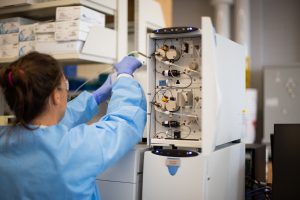Institute’s new and extended multidisciplinary mandate provides national leadership for advanced mining research and innovation

In U of T’s Mining, Water and Environment Facility, Tara Colenbrander Nelson, field researcher, analyzes samples collected from four Canadian mine sites. This unique industry partnership is developing new tools that will enable the mining industry to better monitor, manage and reduce environmental impacts associated with sulphur compounds in their wastewaters.
The Lassonde Institute is expanding its mandate to increase research collaborations across U of T and the Faculty of Applied Science & Engineering. The new direction reflects the interdisciplinary nature of the resource sector today and aims to address complex industry challenges through world-leading research and innovation.
The Institute, now positioned to represent the depth of U of T mining researchers through a collaborative and streamlined approach, expands industry’s ability to overcome and resolve problems while maximizing impact for our society, economy, and planet. Greater research collaborations accelerate new knowledge and innovations for improving worker health and safety and mitigating environmental impacts around water and energy. Increased multidisciplinary partnerships also help the sector’s continued decarbonization work while increasing productivity, as well as recovery and recycling efforts, and automation and digital technologies integration.
“As a Faculty-wide institute, we span the entire breadth of the mining lifecycle with expertise from engineering, earth and environmental sciences, public policy, and beyond,” says Lesley Warren, Director, Lassonde Institute. “We are growing the innovation ecosystem through our transdisciplinary work and expediting innovations for companies by reimagining what mining research can achieve for industry.”
Both increasing resource demands needed to build a more sustainable future and the urgent concerns around societal and environmental impacts are dramatically reshaping the resource sector. To lead and develop leading-edge, sustainable technologies, Canadian and multinational companies need an expanded innovation ecosystem to tackle complex challenges and secure success for our communities and planet.
“For Canada to be successful and for companies to meet global demands, we must lead technology development and relevant knowledge innovations. Our industry requires continuing efforts and a commitment to sustainable solutions,” says Ian Pearce, former CEO, Xstrata Nickel. “If our innovation ecosystem is incomplete or fails to maximize university research and development, our sector is at risk of missing commercial, economic, and environmental successes.”
The Lassonde Institute is pivoting to address current needs as well as emerging challenges associated with complex sustainable development efforts. A crosscutting Institute with access to University-wide experts and researchers represents a greater commitment to future discovery and sustaining efforts to expand research partnerships.
“This is an exciting new phase in the evolution of the Lassonde Institute,” says Christopher Yip, Dean of the Faculty of Applied Science & Engineering. “By bringing U of T researchers together and expanding our global partnerships, we are generating concrete solutions to many of the multi-faceted challenges facing the industry today, and further solidify Toronto and Canada as a mining innovation leader.”
Learn more about the Lassonde Institute
Today, the Lassonde Institute is helping industry solve global challenges with a scale and scope designed for greater impact in important areas. The Institute recently named six ‘Research & Innovation Priorities’ representing the comprehensive expert capabilities and work supporting the future of mining and innovations ready for industry adoption. The 2021 Lassonde Research & Innovation Priorities are: Energy & Sustainability; Exploration; Robotics, Machine Learning & Big Data; Safer Mines; Society & the Economy; and Water & Tailings.
Some of the internationally leading Institute research includes:
- Energy & Sustainability: Professor Gisele Azimi (ChemE, MSE) works to reduce industrial solid waste through waste valorization recovering strategic materials like rare earth elements.
- Energy & Sustainability: Professor Mansoor Barati (MSE) explores the development of processes for the recovery of metal values from ore resources to reduce the energy intensity and environmental footprint of mining companies.
- Exploration: Professor Melissa Anderson (Earth Sciences) develops advanced technologies for deep-sea environments, including Autonomous Underwater Vehicles and machine-learning approaches applied to hydroacoustic data to aid in the exploration of ore deposits on the modern seafloor.
- Robotics, Machine Learning & Big Data: Professor Sebastian Goodfellow (CivMin) focuses on the application of machine learning to traditional mining datasets to extract new insights and improve operational efficiency.
- Robotics, Machine Learning & Big Data: Professor Birsen Donmez (MIE) focuses on human-automation interaction to improve the supervisory control of unmanned vehicle operation in the underground environment.
- Safer Mines: Professor Giovanni Grasselli (CivMin) explores destabilizing mechanisms in underground structures to optimize mining approaches for the safe extraction of subsurface natural resources.
- Safer Mines: Professor Murray Grabinski (CivMin) develops advanced underground backfill design methods for faster ore extraction rates with reduced ground closure and seismicity.
- Society & the Economy: Professor Emily Moore (iLead) explores how engineers learn to lead in the classroom and the workplace to inform industrial strategies for developing engineering mining talent.
- Water & Tailings: Professor Lesley Warren (CivMin) examines bacteria present in mine tailings to create new biologically informed practical tools enhancing the environmental practices of the mining industry.
If you are ready to explore the potential of innovative research and technology development for your company, please reach out to our Director, Lassonde Institute, Lesley Warren to get started today.
